AudioCulture
The noisy library of New Zealand music
Te pātaka korihi o ngā puoro o Aotearoa
The Henchmen
There are some things you don’t do without expecting some kind of menace. Like invoke the spirit of Iggy Pop. But invoke Iggy’s spirit they did and whatever pact The Henchmen signed with punk’s dark prince, it ensured the West Auckland Detroit-punk outfit were never forgotten.
Their shows had the smoldering violence of a punk Altamont. There were bikers lined up outside suburban halls, skinheads attacking the drummer inside and Norm Williamson (Anthony Norman) smashing his guitar onstage. Their drunken belligerent singer Tony Stooge (Collins) took to himself with a shard of glass from a garage window that had just exploded inward.
There are some things you don’t do without expecting some kind of menace. Like invoke the spirit of Iggy Pop.
Cue the late 1970s in Auckland, New Zealand. The Scavengers are all over the tabloid press. Suburban Reptiles are playing in Auckland’s Albert Park. Television New Zealand is following a busload of Auckland punks to a Wellington Town Hall punk festival. Bryan Staff and Barry Jenkin are making commercial radio and music TV bite. New Zealand’s most active punk scene is taking off. And watching it happen are two Te Atatu teenagers, guitarist Anthony Norman, Ramones fan, and surly belligerent mate, would-be vocalist, Tony Collins.
They are Rutherford High School students – products of blue collar Te Atatu in Auckland’s western suburbs, and a budding punk band. Like the punks they’d read about, they were bored by the flaccid rock of the early 1970s. The heavy rock bands they’d liked in their early teens were now in decline. The new music coming out of New York – Patti Smith, Dictators, Raw Power-era Iggy, The New York Dolls – now that was exciting. More current punk delights came via a friend’s big brother who was sending back Sex Pistols singles and live punk tapes from London.
Activated by the clarion call of punk and excited by the active Auckland punk scene, Collins and Norman copped a title from an Iggy Pop song and formed The Dum Dum Boys. The creative chemistry was there from the beginning and with second guitarist Roy Muir, Norman started thrashing out his punk riffs. Collins then mixed and matched his prolific output of back street scenarios.
They played some covers, including The Ramones’ ‘Teenage Lobotomy’ and ‘Shock Treatment’, Sham 69’s ‘Borstal Breakout’ and The Dead Boys’ ‘Sonic Reducer’. But it was mainly new material. The most prolific writers in New Zealand punk were cranking it out. When they emerged from the garage Muir was gone, replaced by Collins’ friend, Mike Stininski with Rutherford High School old boy Dean Larsen drumming.
Iggy Pop’s imbecile proteges
It was a pissed and nervous bunch who fronted up at the April Rock Quest 1980 at the Windsor Castle Tavern in Parnell, Auckland. They knew no one. Worse, their blue-collar Detroit-style punk was about as welcome as a visit from the hardline Team Policing Unit.
Things started bad and steadily got worse. Anthony Norman: “All the other band members were in the toilet and we heard this ruckus coming over the PA. Tony’s up on stage telling someone to fuck off. He’d been up there doing mic levels and immediately got booed and howled down and gave them a soundcheck like: “Fuck off, you dog,” and “Sit down, you slut.” At that point, most of the judges crossed the band’s name out.
Then Norman’s amp exploded and no one would lend him one. He had to walk off and start taking things from the other bands as they stood by horrified, but unable do anything because the boot boys had taken a liking to The Dum Dum Boys and were crowding round Norman.
The Dum Dum Boys played three songs before being stopped by a sound problem. The pub crowd started yelling, setting off Collins yelling and screaming at those screaming at him. He spotted a guy with a jug with lemon and cherries hanging out the side, tore off the stage, ripped it off him and proceeded to drink it, forgetting all about singing, as the band played on.
RipItUp wrote it up. “Iggy Pop’s imbecile proteges The Dum Dum Boys played for 10 minutes, and played with their gear for the rest of the time.”
Let There Be Noise
The Dum Dum Boys, by now stacking up quite a few originals, decided to capture them in demo form to play to venue bookers. They set out to record four songs at Harlequin Studios in early 1980 with new bassist Chris Bligh and didn’t stop until they had their first album, the raw nerve, Let There Be Noise. Along the way Collins violently jettisoned drummer Larsen.
Norman: “Tony had a fight with him in the studio. When it came to finance the album, Dean couldn’t contribute cash so he was going to get a car to carry the gear around in. Then he turned up at the studio in a Japanese sports car.”
Goodbye Dean Larsen. Joz Hodzelmans filled in on drums for the album’s last two songs with Crash McThrob (engineer Steve Kennedy) playing over Larsen on ‘Stalking The Streets’.
It was New Zealand’s first full-length punk rock album by a single act – a raw clutch of borrowed riffs, tin shed sound, and Collins’ dark backstreet narratives.
The first 500 sold quickly. Collins and Norman set up a stall in a bus stop in inner city Queen Street. They didn’t sell many copies that day, but they made the Auckland Star, and among the purchasers were student scribe Garth C (Cartwright) and Jeremy Chunn – a fellow Detroit punk fan destined to be their bass player. The album stretched to a second pressing (white cover opposed to the first pressing’s black).
To promote the release of Let There Be Noise, Tony Stooge and manager Robyn Vamp booked a series of hall shows around the Auckland suburbs. They used a small PA, bought with cash raised by selling the contents of Vamp’s Massey home, which also financed the album’s recording and release.
Three hundred West Auckland punks caught The Dum Dum Boys at the Flanshaw Road School hall and two hundred saw them at the Glen Eden Primary School hall.
The Dum Dum Boys were back in the inner city again at XS Cafe in late November 1981. Their growing number of fans could also catch them at Massey Hall with fellow West Aucklanders The Famous Five, while outside, a row of Highway 61 hogs and riders lined up, praetorian guard to the scattered punk overflow from the hall. Further down in Massey township, half a dozen police cars were waiting for the inevitable violence to spark amongst the scattered punk debris outside. When it did, the show was closed down.
Billy Williams, the new drummer was a young West Auckland punk who’d cut his teeth in The Executioners, a Mount Albert school punk band, which featured one Neil Roberts, the anarchist who in 1982 bombed the Wanganui police computer centre, the hub of New Zealand’s information on its citizens. Williams had heard The Dum Dum Boys’ first album and had been impressed.
“When I joined the band, we recorded what was to be the second Dum Dum Boys album – Death or Glory – at Harlequin Studios. It cost two to three thousand dollars to record. A lot of those songs ended up with different lyrics on the We’ve Come To Play album.
“I’d been in the band for nine months, switching between bass and drums, until we managed to secure a drummer, Mark Maelstrom from Te Atatu.”
When The Dum Dum Boys fronted up at the Mainstreet Battle of the Bands in May 1982 the reception was good. Too good. They finished the set with ‘Celebration Of Sin’, the song that would become ‘We’ve Come To Play’ with Tony launching into a monologue: “We know this gig is rigged. Everyone knows The Gurlz are gonna win.” And they did. The Dum Dum Boys weren’t placed.
Billy Williams: “They deliberately stuffed up the mix. Tony’s voice was going up and down, the guitar vanishing. Tony was abusing the soundman so he switched off the monitor.
“It was his mic and Tony was doing a Daltrey with it. The guy came up on stage and grabbed it off him. Tony went to another mic and started cursing at the crowd: 'This is a rip off'. A bunch of skinheads saw the soundman take the mic and took him backstage and dumped him. We didn’t know this, we were playing and all of a sudden all these guys are onstage trying to pick a fight with Tony.” Collins and Norman wouldn’t play Mainstreet again until May 1983.
With live shows scarce The Dum Dum Boys became The Henchmen and in August 1982, released a ferocious version of Iggy and the Stooges’ ‘I Got A Right’ backed with ‘Rock And Roll Attack’ on their own Cadaver Records. Billy Williams, who’d played bass and drums on the single, left the band soon after.
The Henchmen followed ‘I Got A Right’ with more aggression, this time a la Radio Birdman. Namely a hard stomping three chord tribute to their Ozzie heroes called ‘Do The Maelstrom’ backed with ‘Apocalypse’. The lyrics were a line here, a line there, out of Birdmen songs, turned into one song. To top it off, Collins wanted a sleeve with the Radio Birdman logo on it. Norman did the artwork under duress, worried about the plagiarism. He was right to be. Radio Birdman singer Rob Younger wasn’t impressed and would later say so aloud.
He was right to be. Radio Birdman singer Rob Younger wasn’t impressed and would later say so aloud.
Musically, the record is one of the band’s best. Released in the large 12-inch format for better sound, and recorded live in the more intimate Progressive Studios by a hanger-on from the studio – Rob Chamberlain from Aellian Blade. The record has a classic late sixties sound, raw but clear with the guitars stomping through. New drummer Rick Dean filled out the sound with Norman playing bass.
Norman: “Rob was the cleaner. He got paid in studio time and offered to engineer us. He did a really good job with four mics, a classic 1960s sound live in the pool room on the stage.”
When it was released in March 1983, ‘Do The Maelstrom’ received a grudging thumbs up. It was hard not to notice the whiff of disdain. Punk was old news. The diaspora was here and a troglodyte quartet from West Auckland dragging the rotting corpse of punk rock back into town wasn’t very 1983. A different kind of club culture was beckoning the original punk cult.
Norman: “In the Auckland scene we were a band apart as the only Auckland post-punk band that didn’t have anything to do with the clique. They’d all play the same clubs. We couldn’t get in. No one would play with us except Vicious Circle. We decided we didn’t need the rest anyway.” A trail of graffiti in the inner city proclaimed defiantly that The Henchmen will play, but it wasn’t to be often.
We’ve Come To Play
When The Henchmen returned to the studio to record their first album they had a new bass player, Jeremy Chunn, younger brother of Mike and Geoff Chunn of Citizen Band and Split Enz fame.
Anthony Norman remembers their first meeting at the studios: “Tony wasn’t that impressed. He said: 'Yeah, what do you want?' He thought (Chunn) was going to bugger off in a few days like some of the others.” Chunn was also middle class. His father was a doctor. He’d attended top notch Auckland Grammar. It was a fact they were all conscious of.
But Chunn stuck. He was a major Detroit rock fan. I watched a young Chunn, dressed in striped tee shirt, denim jacket with metal badges and sneakers, tear down an over-preened bunch of British-influenced punks called Public Enemy after they dismissed American punk during a showing of the punk documentary The Decline of Western Civilisation. The incident demonstrated another prevailing ignorance of the day. That American punk was a laughable concept.
Billy Williams returned to the drum seat after a chance meeting in an Auckland music store. Williams: “They’d found Jeremy Chunn in March 1983. The Henchmen started to get more gigs. We knew we were great. That it wasn’t our fault we weren’t taking off with the general public. There seemed to be two camps – New Romantics and anything that was thought of as punk was GBH and The Exploited. What we were playing was heavy metal shit to them. We had a small hardcore following who became Vicious Circle then Dead Image.”
The Henchmen were playing Mainstreet mid-weekers and hiring halls around West Auckland playing to sizeable crowds in Mount Roskill and Oratia then losing their bond when the toilets got kicked in. On May 28, 1983 they played at the Mount Albert Primary School Hall with Vicious Circle, having played the weekend before at the Blockhouse Bay Primary School Hall.
Billy Williams: “At the end of the show we did a bit of a Who with our instruments just for the hell of it. No one was around. Norm threw the Ibanez Firebird copy offstage. It fell to pieces. I kicked my drums over, picked up my floor tom, and hurled it.
“I couldn’t see anybody because of the stage lights. The drum hit a monitor and did a neat little arc and clocked this huge skin on the forehead. He was not too happy and came up and grabbed me.”
Norman: “This guy was a bit of a nutcase. Tony and I calmed him down and he started to walk off. Tony walked off, and I turned around, and he made another screaming run at Billy. We tackled him again.”
The Henchmen’s new cohesion showed on their classic, only LP, We’ve Come To Play, a fist full of hard guitars and lonesome Iggy howl recorded by Terry King at Progressive Studios in Auckland in July 1983. When it appeared in August 1984, it featured some mighty familiar riffs and words plus re-recordings of their singles.
Norman: “Anything not nailed down was ripe for picking. We always thought The MC5 stuff could be done a lot faster. We did ‘Kick Out The Jams’ live and rehearsed ‘Ramblin’ Rose’.”
Two versions of the album exist. The first accidentally pressed with between song chatter intact and five songs on one side and three on the other. The more common version has four songs a side, and no chatter.
Punk stronghold New Plymouth – mid 1983
The Henchmen’s guitarist Tony Norman is in dangerous trouble. His mate has just informed him that the crazy woman he’d pinned up against the wall for attacking him and ripping off his Henchmen patch, belonged to one of the Magog gang.
His mate has just informed him that the crazy woman he’d pinned up against the wall for attacking him and ripping off his Henchmen patch, belonged to one of the Magog gang.
Relief of sorts. The Magog had already sussed Norman out about the patch, hassled him a bit then when he explained, they wrote The Henchmen’s show time and venue on the pub blackboard. They were extra tetchy after a run-in with the Devil’s Henchmen down the line, they explained. The woman was a nut and they didn’t care what he did to her.
Billy Williams: “When they found out we were a band, it was cool. They were good guys. Quite supportive. The local punks didn’t want to know. 'Heavy metal shit,' got yelled out all the time. There was a guy on all fours being led around on a dogchain by his mates.”
Norman: “A lot of people turned up that night. The Magog turned up to make sure we got our bond back. All these skinheads turned up and we told them to leave. They said make us. Some big heavy voices behind them said, 'We will.' They preceded to leave quickly.”
Bitch Goddess
After repeated knock backs from TV music show, Radio With Pictures, a sympathetic ear had turned up at the show’s maker, Television New Zealand (TVNZ). The human the ear was attached to remembered bands like The MC5 and The Stooges. He said he’d arrange a video. In early 1984, The Henchmen packed their equipment and a caseload of Elephant beer, jumped into the van and headed down to Wellington, grabbing their roadie, David Boulton to stand-in as bassist following Chunn’s departure in November 1983.
They were directed towards the normal uninspired TVNZ set of the day with tinsel hanging down and not much else. The band mimed amongst it. The song selected, and eventual third Henchmen single ‘Bitch Goddess’, rode along on a riff borrowed from the MC5’s ‘Come Together’ and a lyric that was a trademark MC5 refrain, “Kick out the jams, motherfucker.” The censors caught the profanity the first time it was played, but when it was played again at the end of the year as one of the 10 best New Zealand clips, it went to air uncensored.
Mainstreet, Motorhead and the lost second Henchmen album
The Henchmen had a fan in Greg Carroll, the sound man at Mainstreet and the roadie later immortalised in U2’s ‘One Tree Hill’. He offered them some Buck a Head nights there and the support for Motorhead on July 27, 1984.
With their mate Rowan Shedden (The Dabs/The Ainsworths) on bass and backing vocals, the Motorhead support kicked hard. The crowd reaction was good. A surprise to the nervous Henchmen who’d expected to go down like a lead balloon at the headbangers' affair.
They were originally scheduled to play twice, but with Anthony Norman’s fingers torn to shreds from the first performance, he was in no mood to, or even capable of, playing again. It was to be their final New Zealand show.
The Henchmen retreated to Progressive and Harlequin Studios to record their second album with Rowan Shedden and Billy Williams, tentatively titled Excelsior Obermensch. It was abandoned, victim to the band’s constant line-up changes and bulging songbook. Most of the songs turned up in re-worked form on Norman and Collins’ first post Henchmen LP.
Anthony Norman: “Months would go by when we couldn’t get anyone to record, or even be in the band. There were long periods of down time. It was because of that, the second album never came out.”
Australia
Frustrated and still virtually unknown at home, Norman, Collins, and Vamp packed The Henchmen’s half-finished second album into a suitcase in November 1984 and moved to Sydney, Australia in search of a more receptive audience. They’d decided Australia, a country with a fondness for The Stooges, Iggy, and The MC5, and home of Radio Birdman and The Saints, would be a more ideal stepping stone to Europe, England, and the United States where Australian bands with a Stooges swagger were being taken seriously.
They released ‘Death Machine’ backed with ‘Bitch Goddess’ in early 1985 to let the punters know they were still alive, and fielded an album offer from France’s premier rock and roll independent, New Rose Records.
Alerted to the existence of an Ozzie 1960s outfit called The Henchmen they decided to “shed old skin” and became Reptiles At Dawn. The first release under their new name was Naked In The Darkness, a stopgap album released in 1986 on New Rose Records in Europe and the band’s own Cadaver Records in Australia and New Zealand.
Naked … was made up of reworked remnants from the abandoned second Henchmen album, such as ‘Death Machine’, ‘Lizard Bride’, ‘Bridge of Light’, ‘A Season Of Hell’, ‘Stealers of Fire’ and ‘Excelsior’, and a re-recorded cranked-up version of ‘We’ve Come To Play’ from the sole Henchmen album. Despite its cobbled together nature, Naked In The Wilderness is easily the best Collins/Norman album. They knew their way around a studio by then and just as We’ve Come To Play built on Let There Be Noise, Naked In The Wilderness retained the latter’s raw power and the former’s songs and attitude.
The standard is set right from the first Stoogey budda budda budda of ‘Zenith’, a staunch statement of intent that has several proto-rap rants from Collins amongst its hard Detroit clutter. ‘Excelsior’ slams a machine gun riff in your face, and gets a good wah wah kicking from Norman. ‘Stealers of Fire’ kicks along on a smooth punk riff out of Deniz Tek’s early Radio Birdman songbook as Collins' words paint a pagan orgy of images. ‘We’ve Come To Play’ closes side one with a New York punk riff courtesy of The Dead Boys, one of those tough melodic hard rock tunes with the 1960s peeking through. ‘Lizard Bride’ is oblique intense psychobilly wrapped up in a hamfisted riff. Funhouse and the dark shamanism of The Doors inform the weary drug addled blues of ‘Bridge of Light’, which sits uncomfortably beside The Saints-like open highway throttle-down punk of ‘Season Of Hell’, a savage reworking of The Henchmen’s ‘Do The Maelstrom’ and the James Dean tribute ‘Death Machine’.
‘Zenith’ and the non-LP ‘Borderline King’ were plucked as a single in 1986. It was a hit on American college radio. New Rose Records were impressed enough to stump up ten grand for another album.
Live, however, the curse continued. They hadn’t settled on a line-up and a year had frittered away. In the end, Reptiles At Dawn only played three Australian shows. Billy Williams last saw them in Sydney: “It was one of those free industry gigs at Sydney Cave Tavern. They went down like a lead balloon. The crowd didn’t take to them. Tony was in fine form calling people in the crowd fuckwits. Typical.”
The third and final Reptiles At Dawn show was at the Randwick Racecourse Hotel with new drummer Michael Austin and New Plymouth native Andrew Hume on bass. Hume was leaving for England, so Reptiles at Dawn followed.
They settled in London in February 1987 and began rehearsing with an English bass player. After The Plague, a double 7-inch EP with four unique tracks appeared later that year along with a cover of The Heartbreakers/Ramones’ ‘Chinese Rocks’ on the Play New Rose For Me compilation.
In March 1988, they recorded Dressed In Flesh in Paris with new drummer Gurvan Guellic, and played extensively in France and Europe. When their visas ran out, the two Tonys headed for home.
Dawn of the Reptiles
Back in Auckland, Collins and Norman recruited Tony Baird (bass) and Tony Gallagher (drums) for their first show in December 1989. Ima Hitt Record’s Brian Wafer released a 7-inch EP, Nighthawks In Exile, on Sonic Heist Records, containing four remastered tracks from Dressed In Flesh.
Reptiles At Dawn returned to Auckland properly with a Powerstation showcase in late February 1990 supported by the NZ punk hierarchy of Sticky Filth, Salad Daze and The Warners.
The next month, they played the aptly named Night Of The Iguana at the Keynote Club, and at Auckland’s Gluepot, returning there in July ahead of a North Island tour which took in Wellington (twice) and New Plymouth’s Sonic Arts Centre. In October, they began recording Lost Disciples, their third album, at Montage Studios in Auckland. It would eventually appear in early 1991 on Ima Hitt Records, preceded by a cassingle of ‘Time Turns Strange’ and ‘Paradise Dreams’ featuring actress Vanessa Rare. It’s a record Norman has little time for, now thinking it “under-recorded". Reptiles at Dawn soon disbanded.
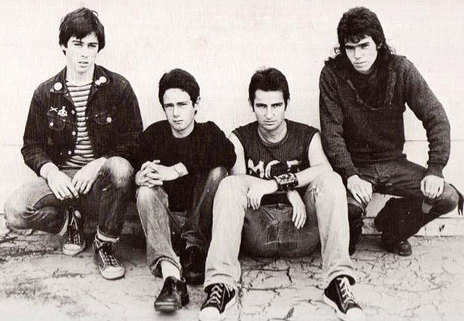
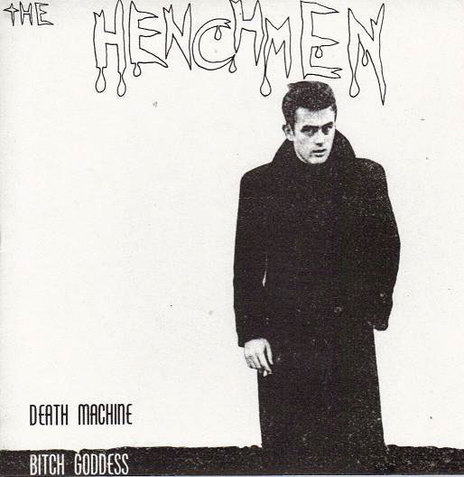
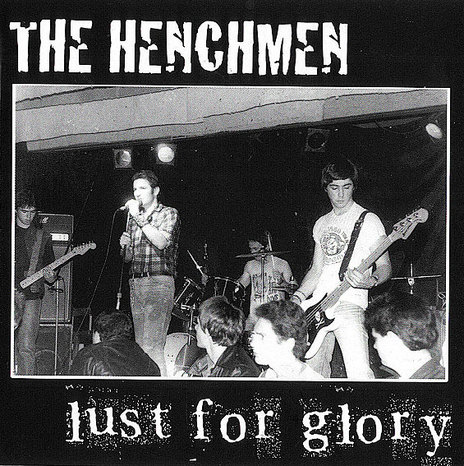
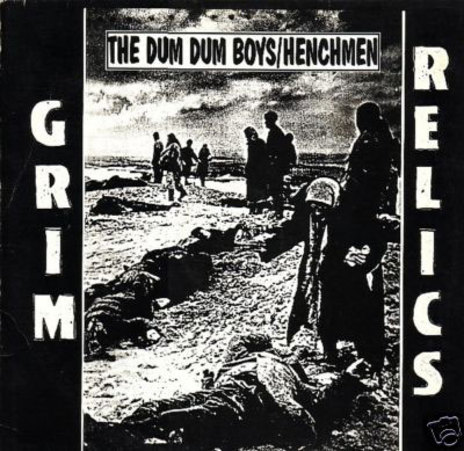
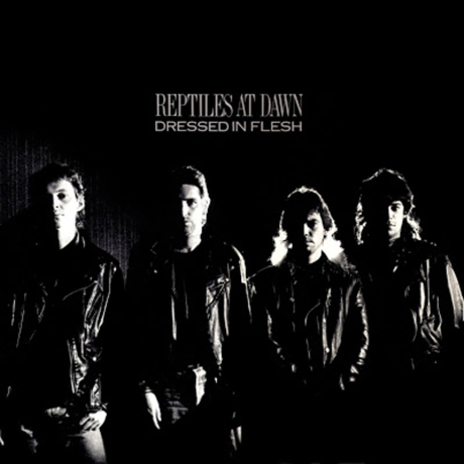
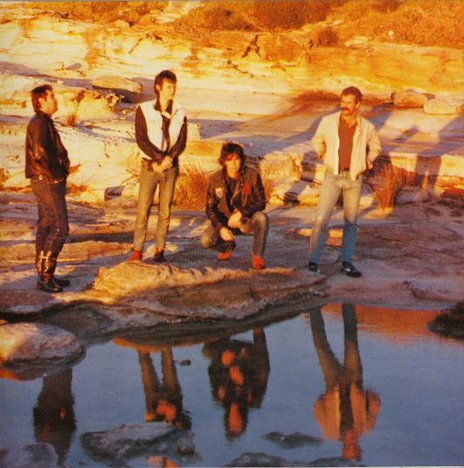
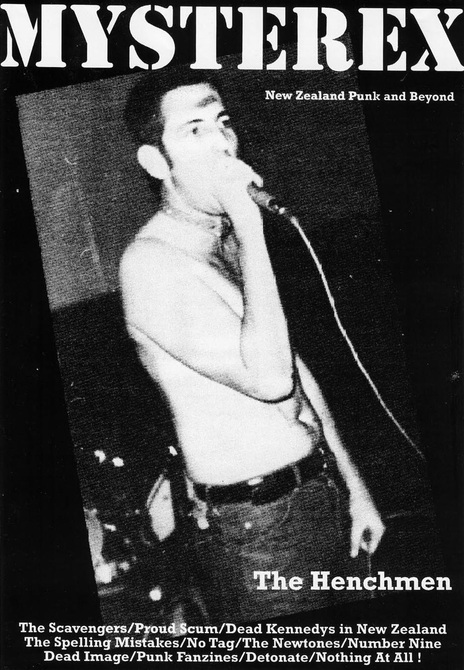
The Henchmen’s Tony Collins and Anthony Norman attended Rutherford High School in Auckland’s western suburb, Te Atatu. Rutherford High is one of the city’s best known rock and roll high schools having already produced The La De Da's.
The Dum Dum Boys and Henchmen records are now seriously collectable, fetching in excess of $1000 each on Ebay when they are sold - which is not often.
Anthony Norman - guitar
Tony Collins - vocals
Jeremy Chunn - bass
Rowan Shedden - guitar
Billy Williams - drums
Cadaver Records
Visit our sister site
NZ On ScreenMade with funding from
NZ On Air
